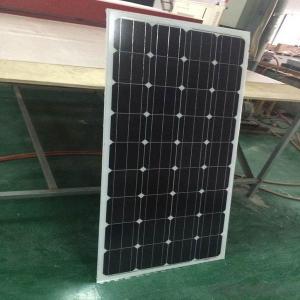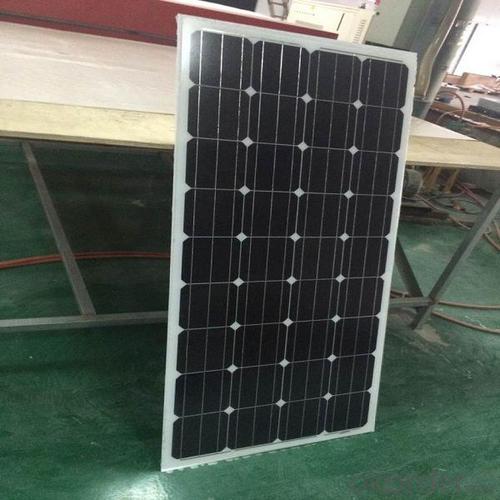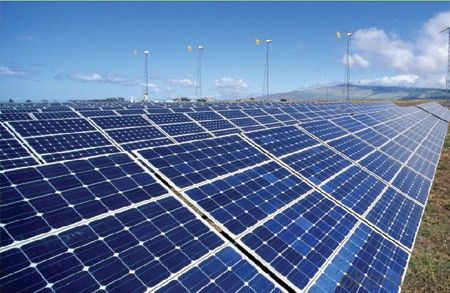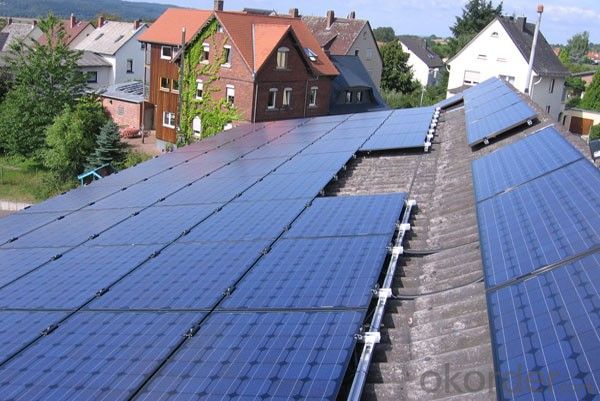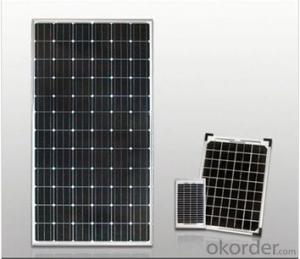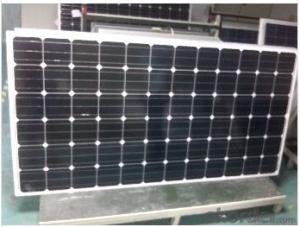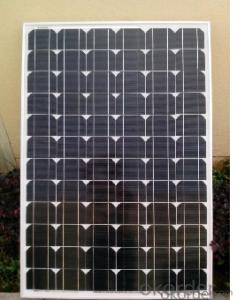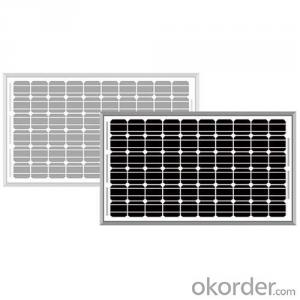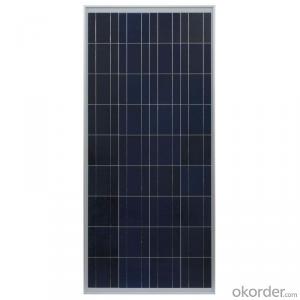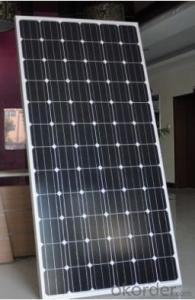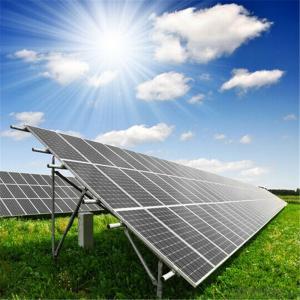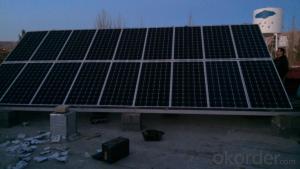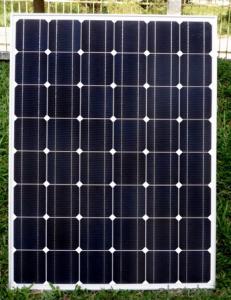300w Monocrystalline First Solar Solar Panels for Sale
- Loading Port:
- Shanghai
- Payment Terms:
- TT OR LC
- Min Order Qty:
- 10000 watt
- Supply Capability:
- 1000000 watt/month
OKorder Service Pledge
OKorder Financial Service
You Might Also Like
Specification
Product Description
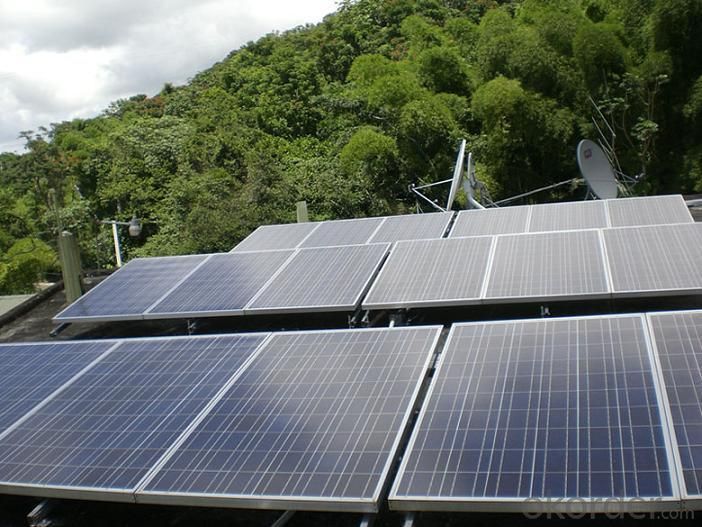 Electrical Characteristics
Electrical Characteristics
| Optimum Operating Voltage (Vmp) | 37V |
| Optimum Operating Current (Imp) | 8A |
| Open Circuit Voltage (Voc) | 44.6V |
| Short Circuit Current (Isc) | 8.5A |
| Module Efficiency | >=17.6% |
| Operating Module Temperature | -40 ºC ~+85 ºC |
| Maximum System Voltage | 1000V |
| Power Tolerance 0/+5 W | +/-3% |
Mechanical Characteristics
| Solar Cell | Mono |
| No. of Cells | 36(4*9) |
| Dimensions | 1950*992*45mm |
| Weight | 23kgs |
| Front Glass | 3.2mm high transmission, Low Iron, Tempered Glass |
| Frame | Anodized aluminium alloy |
| Junction Box | 4mm2, length 1000MM,TUV |
Temperature Characteristics
| Temperature Coefficient of Pmax | -0.47/ °C |
| Temperature Coefficient of Voc | -0.38/ °C |
| Temperature Coefficient of Isc | + 0.1/ °C |
Warranty
| 12-year product warranty |
| 25-year linear performance |
Packaging
2pcs/carton, 180pcs/20GP or custom
Features:
1. This monocrystalline solar cell has a high performance efficiency up to 17.6%.
2. Long Service Life can reach more than 25 years under maintenance according to stipulation.
3. Reliable quality leads to a better sustainability even in harsh environment like desert,farm and coastline
4. High Transmission, Low Iron Tempered Glass adopted.
5. Advanced Cell Encapsulation.
6. Yunkai modules are proven for the reliability and superior field performance due to high-standard raw materials used, stringent quality control process and advanced manufacturing technologies.
Application:
1. Solar power station, field operation some huge engineer construction;
2. Living house and home building;
3. Office building, factory and warehouse;
4. other industrial and commercial applications.
- Q: Do solar panels require cleaning?
- Yes, solar panels do require cleaning to maintain their efficiency. Dust, dirt, bird droppings, and other debris can accumulate on the surface of the panels, blocking sunlight and reducing their ability to generate electricity. Regular cleaning helps ensure optimal performance and maximizes the energy output of solar panels.
- Q: Can solar panels be used in areas with high levels of humidity?
- Yes, solar panels can still be used in areas with high levels of humidity. While high humidity can affect the efficiency of solar panels to some extent, they are designed to withstand various weather conditions, including humidity. However, it is important to note that regular maintenance and cleaning may be required to ensure optimal performance in such environments.
- Q: Can solar panels be used in areas with high levels of hurricanes?
- Yes, solar panels can be used in areas with high levels of hurricanes. However, it is important to ensure that the solar panels are designed and installed to withstand strong winds and other extreme weather conditions. Proper mounting and anchoring techniques, along with robust construction materials, can increase the resilience of solar panels against hurricanes. Additionally, regular inspections and maintenance are necessary to ensure their functionality and safety in such areas.
- Q: By best I mean safest places. If I were to install them on my roof am I risking due to damage from weathering? Such as rain or snow. I don't get very high winds around here, nor any natural disasters such as hurricanes or tornadoes. Does anyone have solar panels that have been durable for a long time? Is it worth the investment?
- The best place is where they get the most sunshine. Naturally they will be exposed to rain and snow.
- Q: I have a solar panel 7.5V .25W 50mah, connect 2 in parallel to power a RC boat. The boat use to run on 6cell battery pack - 7.2V 800Mah.The dc motor requirement based on the provided battery pack, i assume would be 7.2V and rated at (7.2V * .8Amp) = 2.96 Watt.Would two of my solar panels run this DC motor ?are my calculations or understanding correct ?do lend a hand dear ''world''
- Wood? Steel tubing could be a lot lighter. Use the hardest narrowest tires you can find bicycle wheels and tires would work nicely and they can be had with really light disc breaks. As for a motor a golf cart motor is made to order. You can get an old electric golf cart and have almost all the parts you will need. Hell cover the roof of the cart with photo voltaic and have a ball. Note I stress weight savings as weight will cost you energy and with photos you won't have much to spare. You will need a battery pac of some sort lithium are a better choice than lead acid. there is a ton more to consider good luck with your project.
- Q: does it mean that it can get that much in a day? Or like, in an hour?
- Wattage okorder
- Q: How about using Solar Panals to provide the electrical power to separate the H2 from the O? H2 would be fed into the engines carburator like a gas/air mixture ratio, but H2/air mixture ratio instead. How would you control the exact measurements?
- It's a great idea, but there are problems. The first is that hydrogen is very difficult to control; it is a small molecule, and very slippery. It is difficult to handle from that perspective; Teflon tape and other common plumbing techniques just don't cut it. Secondly, once you have the hydrogen, you'd have to compress it in order to put it into a cylinder of some sort. This takes electrical power, and in turn is wasteful. Compressed hydrogen storage has is own risks, including hydrogen embrittlement, and the peculiar nature of hydrogen (including having an invisible flame, and a remarkably wide flammable range) makes it quite dangerous. After all, relatively safe products such as propane gas and butane lighters- well-established and very common- are surprisingly dangerous, causing injuries and fatalities each year. In order for something that is more dangerous (hydrogen) to come to market as being a hydrolysis product, either the products will have to be home-made (and therefore more dangerous), or very expensive.
- Q: Can solar panels be used in areas with high humidity or saltwater exposure?
- Yes, solar panels can be used in areas with high humidity or saltwater exposure. However, it is important to use solar panels specifically designed to withstand these environmental conditions. These panels are typically made with corrosion-resistant materials and protective coatings to ensure their longevity and performance in such areas. Regular maintenance and cleaning may also be required to prevent any build-up or damage caused by saltwater or high humidity.
- Q: Can solar panels be installed on train stations?
- Yes, solar panels can be installed on train stations. In fact, many train stations around the world are adopting solar energy systems to power their operations and reduce their carbon footprint. Solar panels are installed on the roofs or canopies of train stations to harness sunlight and generate electricity, which can be used for lighting, heating, cooling, and other station facilities. This renewable energy source makes train stations more sustainable and helps in the transition towards a greener transportation system.
- Q: My family moved into a house that came with solar power panels but they are not connected and don't really understand how to even begin.
- You will need help with this. Panels may or may not be 24 volt. If you can find a name tag, you can find out from the manufacturer's web site. Some folks hook them all in parallel. Mine are in series, to create 480 volts. the reason for going to higher voltage is to reduce power loss in the wiring. Even then, I used a wire size larger than recommended. The frames want to be interconnected, and wired to ground. The live conductors connect through disconnect switches to an inverter. The inverter is sized to the output of the panels. Where the utility allows net metering, the inverters are connected through a disconnect switch to the grid, which of course also feeds the house. Assuming you are on the grid, you will not need batteries. If outages severely impact you, you can have batteries. Counting against them is that they are costly, and use part of the power you generate, just to keep them charged. If you have batteries, it is usually best to rewire circuits so noncritical circuits are disconnected during outages. Leaving perhaps minimal lighting, fridge, freezer and critical medical circuits. Learn all you can from the Internet (try solar panels), and from the green search box above. Be sure to see if your state has a rebate program, and the conditions which it requires.
Send your message to us
300w Monocrystalline First Solar Solar Panels for Sale
- Loading Port:
- Shanghai
- Payment Terms:
- TT OR LC
- Min Order Qty:
- 10000 watt
- Supply Capability:
- 1000000 watt/month
OKorder Service Pledge
OKorder Financial Service
Similar products
Hot products
Hot Searches
Related keywords
